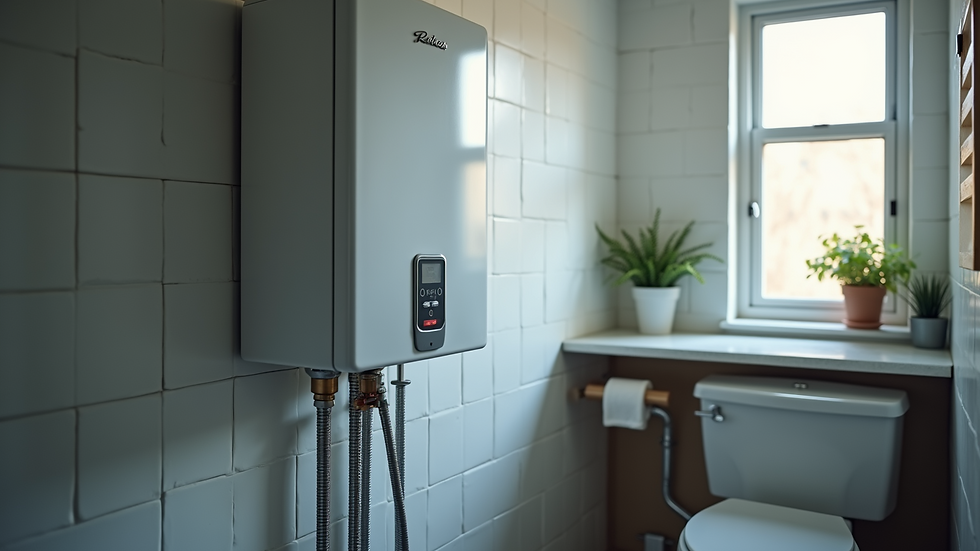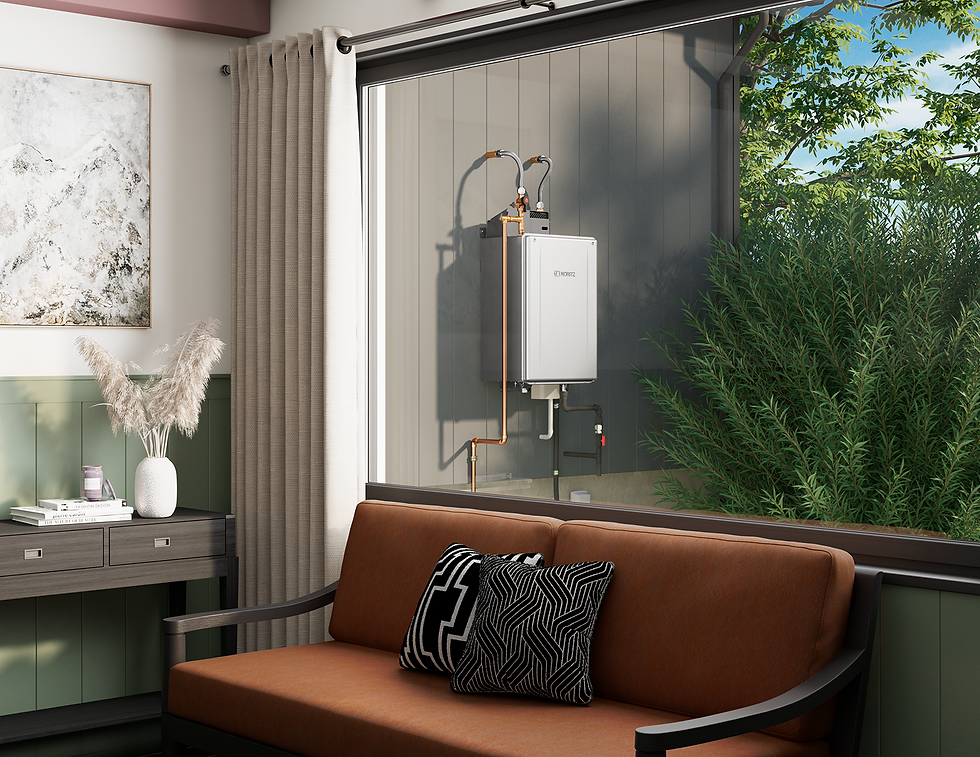Top Benefits of Switching to a Tankless Water Heater
- Manny Garcia
- Aug 15, 2025
- 4 min read
Updated: Oct 7, 2025
When it comes to upgrading your home's water heating system, many homeowners are considering tankless water heaters. These modern devices offer a range of advantages over traditional tank-style heaters. If you are looking for a more efficient, space-saving, and cost-effective solution, switching to a tankless water heater might be the right choice. This article explores the top benefits of tankless water heaters and why they are becoming increasingly popular.
Understanding Tankless Water Heater Pros
Tankless water heaters, also known as on-demand water heaters, heat water only when you need it. Unlike conventional water heaters that store hot water in a tank, tankless models heat water directly as it flows through the unit. This fundamental difference brings several pros:
Energy Efficiency: Since water is heated only when required, tankless water heaters avoid the standby heat loss associated with storage tanks. This can lead to significant energy savings.
Endless Hot Water: You never run out of hot water because the system heats water continuously.
Space Saving: Tankless units are compact and can be mounted on walls, freeing up valuable floor space.
Longer Lifespan: These units typically last longer than traditional water heaters, often up to 20 years or more.
Reduced Risk of Water Damage: Without a large tank, the risk of leaks and water damage is minimized.
These tankless water heater pros make them an attractive option for many households.

Energy Savings and Environmental Impact
One of the most compelling reasons to switch to a tankless water heater is the potential for energy savings. Traditional water heaters maintain a reservoir of hot water, which means they constantly use energy to keep the water at a set temperature. This standby heat loss can account for 10-20% of a household's water heating energy use.
Tankless water heaters eliminate this waste by heating water only when needed. According to the U.S. Department of Energy, tankless water heaters can be 24-34% more energy-efficient for homes that use 41 gallons or less of hot water daily. For larger households, the savings are still significant, around 8-14%.
Practical tips to maximize energy savings:
Install low-flow fixtures to reduce hot water demand.
Regularly maintain your tankless unit to ensure optimal performance.
Consider solar water heating integration for even greater environmental benefits.
By reducing energy consumption, tankless water heaters not only lower your utility bills but also reduce your carbon footprint.

Is there an IRS tax credit for tankless water heaters?
Many homeowners wonder if they can benefit from tax incentives when upgrading to energy-efficient appliances like tankless water heaters. The IRS has offered tax credits in the past for certain energy-efficient home improvements, including water heaters that meet specific energy standards.
As of recent updates, tankless water heaters that meet the Energy Star requirements may qualify for federal tax credits under the Nonbusiness Energy Property Credit. This credit can cover a percentage of the purchase and installation costs, making the investment more affordable.
Important considerations:
Verify that the tankless water heater model is Energy Star certified.
Keep all receipts and documentation for tax filing.
Consult a tax professional to confirm eligibility and current credit availability.
Taking advantage of these tax credits can significantly reduce the upfront cost of switching to a tankless water heater.
Space Efficiency and Installation Flexibility
Traditional water heaters require a bulky tank, which can take up valuable space in your home. This is especially challenging in smaller homes, apartments, or areas where space is at a premium.
Tankless water heaters are compact units that can be installed on walls, inside closets, or even outdoors in some climates. This flexibility allows homeowners to reclaim storage space or use the area for other purposes.
Installation benefits include:
Wall mounting frees up floor space.
Multiple units can be installed to serve different parts of a home.
Easier integration with modern plumbing and heating systems.
This space-saving feature is a major advantage for urban dwellers or anyone looking to optimize their home's layout.

Longevity and Maintenance Advantages
Tankless water heaters generally have a longer lifespan than traditional tank models. While a conventional water heater lasts about 10-15 years, tankless units can function efficiently for 20 years or more with proper maintenance.
Maintenance tips to extend the life of your tankless water heater:
Flush the system annually to remove mineral buildup.
Check and clean the water filter regularly.
Schedule professional inspections to ensure all components are functioning properly.
Because tankless water heaters do not store water, they are less prone to corrosion and leaks, reducing the risk of costly repairs and water damage.
Why Consider the Tankless Water Heater Benefits?
Switching to a tankless water heater offers a combination of energy efficiency, space savings, and long-term cost benefits. The ability to provide endless hot water on demand enhances comfort and convenience in daily life. Additionally, the environmental advantages align with growing efforts to reduce energy consumption and carbon emissions.
If you are considering upgrading your water heating system, exploring the tankless water heater benefits can help you make an informed decision that suits your household needs and budget.
Making the Switch: What to Expect
Transitioning to a tankless water heater involves some considerations:
Initial Cost: Tankless units typically have a higher upfront cost than traditional heaters, but energy savings and tax credits can offset this.
Installation Requirements: Professional installation is recommended to ensure proper sizing and setup.
Water Flow Rate: Choose a unit that matches your household's hot water demand to avoid performance issues.
By planning carefully and consulting with a qualified plumber, you can enjoy the many advantages of a tankless water heater for years to come.
Upgrading to a tankless water heater is a smart investment that combines efficiency, convenience, and sustainability. With proper installation and maintenance, you can enjoy reliable hot water while reducing your energy bills and environmental impact. Consider the benefits carefully and take the first step toward a more modern and efficient home water heating solution.




Comments